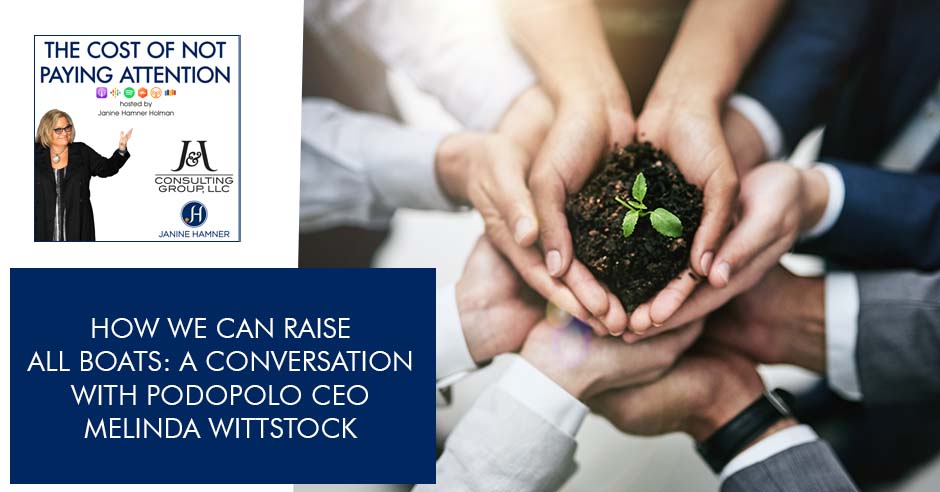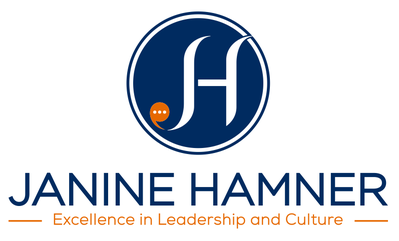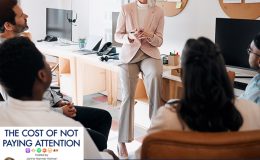
How can you create a business model in the podcasting world where everybody wins? This is a topic that we should pay attention to. Listen to your host Janine Hamner Holman as she talks with Melinda Wittstock about raising all the boats so everybody can thrive. Melinda is the CEO of Podopolo, a company dedicated to unleashing unique superpowers for the next generation of podcasting. In this episode, she dives deep into growing the community and making an impact. A business doesn’t have to focus on generating income but should always consider raising everyone up and watching each other grow. Tune in to learn in-depth insights on analyzing structural problems, growing your reach, and increasing engagement in a time-saving way.
GUEST: Melinda Wittstock | LinkedIn | Visit their Website: Podopolo
HOST: Janine Hamner Holman | [email protected] | LinkedIn, Facebook, Instagram, and Twitter |
—
Listen to the podcast here
How We Can Raise All Boats: A Conversation With Podopolo CEO Melinda Wittstock
What am I paying attention to? I have the opportunity to do this amazing thing. I was the keynote speaker for the County of San Diego. Check this out you all. The County of San Diego here in California has a seven-week-long leadership academy for any leader who has been in a position of leadership for five years or less. They can apply to be in this leadership academy. Sometimes people who’ve been in leadership for a little longer than that can also apply. There was one person who had been with the county for 23 years. I have a hunch that she had been in leadership for more than five years.
The fun part was that they had 41 different departments that were represented in this training. When we think of leadership, and management, we often think about ourselves relative to other people. In my experience, it all begins with ourselves. It begins with getting aware of ourselves, what we are up to, and what we want to create.
The domain of self-awareness is something that I have been paying attention to and thinking about. It connects me with our guest, Melinda Wittstock. I am delighted that she is here with us. She’s a five-time serial entrepreneur who is revolutionizing podcasting and turning it into a socially interactive, personalized, and profitable enterprise for podcasters. Melinda has lived the ups and downs of entrepreneurship. She has grown multiple businesses across media and technology, and is a passionate champion of conscious leadership and social impact businesses.
—
Welcome to the show, Melinda.
Thank you. It’s a pleasure to be with you.
You are so welcome. I’m so excited that you are here with us and I’m happy that we get to talk more about Podopolo.
Someone asked me if Podopolo was my surname, and if I was Greek. It was tricky to figure out what the name should be. We were trying to figure out if all the other parts of the pod were taken or parts of the cast. This is a community. We were thinking about the Greek Polis, but also what connotes fun because the platform is increasingly gamified as well. We played around with Podopoly like Monopoly, except we are not a monopoly. We are anything but that. We settle on Podopolo. It rolls off the tongue once you get it, but people can say it however they like. I don’t care.
Tell me a little more about what we were not paying attention to, either in the world or in the world of podcasting that had you called to create Podopolo.
What individuals, entrepreneurs, and I have learned to pay more attention to is all the subconscious drivers that drive us. We are not aware of it because they’re subconscious. It drives 80% of our actions. If you are an entrepreneur or creating a successful podcast, chances are you have a team, a message to get across, and all these things that need to get done.
To succeed, you have to pay attention to unearthing and releasing those subconscious stories. They are stories that we have invented about ourselves, probably when we were young children without a frontal lobe. They have driven us all our lives, which is why I often joke on my own podcast, “If you want therapy, become an entrepreneur.” It will challenge you in all aspects of your being.

Raising All Boats: If you want therapy, just become an entrepreneur because it will challenge you in all aspects of your being.
I was frustrated about a couple of things about podcasts specifically. One, I thought the listener experience on most podcast apps was poor because the algorithms that worked at the same podcast were showing up all the time. It’s difficult to discover something new and discover a great podcast around what interests you and your friends.
I also was frustrated as a consumer. I would listen to a podcast and I’d want to share an epiphany that I had, or maybe just share a joke. It was impossible to share that episode easily with a friend or to be able to isolate the soundbite and share that, much less have a conversation about it. From the listener and viewer perspective, podcasting was ripe for transformation to improve the listener experience, make it interactive, personalized, and more meaningful, and allow people a mechanism to take what they are learning from a podcast and put it into action in their lives for a transformational outcome, whatever that is, even if it’s a transformation as you fall asleep.
Transformation is when you laugh a belly laugh, or you learn a skill that changes your life, or you make a social impact. It could be anything. In the meantime, podcasters also were not being served very well and what no one was paying attention to was the fact that 85% of podcasters don’t make any money. This is crazy because podcasting is the fastest-growing medium of all time. Podcasters have all their amazing content. What you do with this podcast, what I do with mine, and what 5 million other people do with our podcasts is making a lot of other platforms wealthy, but podcasters were not getting a share of that. On a level, that offended me. I want to change that.
When I launched my own podcast, even with all my business expertise and technological acumen, even though I was an award-winning content producer and host and I had all these marketing chops, it was still hard to grow my reach, grow my engagement, or monetize my podcast. I perceived that as a structural problem that I wanted to change to allow creators to be able to create an income more easily, grow their reach, and engage easily in a time-saving way because most podcasters are overwhelmed. There’s so much to do. How can we save them time? How can we make it easy and grow their revenue?
The same thing that allows us now to place advertising, say for instance, on a podcast that traditionally would not qualify for advertising because they don’t have the 10,000 downloads an episode, which is only around 1.5% of the market. We are changing that with the artificial intelligence that underpins the recommendation engine, but also allows us to understand who’s listening. That means we can deliver a much more targeted audience for an advertiser.
An advertiser knows that even if that podcast only has 1,000 people, rather than 10,000, if 90% of those people are qualified for the offer, it’s going to be a higher conversion rate than the 1% to 2% they would expect on an offer to 10,000 people. This is where we structurally changed the game. There are many other ways that podcasters can earn money as well through our ambassador program, through subscriptions, and much more besides. With all entrepreneurs, we create businesses where we see a gap. We see that someone’s not paying attention to something. Through the gift of our own experience, our personal mission, or lived experience, we see that gap and say, “No one is doing it. I guess it’s mine to do.”
I was having a conversation with somebody who is one of the leaders in Southern California around diversity, equity, inclusion, and belonging. I am in the process of creating an organization for practitioners who do that work because I see this gap. She sees this gap, too. Everybody who does this work sees that we don’t have an opportunity to come together, share resources, and say, “I tried this and it was awesome. I tried this and it didn’t work so don’t do that.”
You have to pay attention to unearthing and releasing those subconscious stories because they're stories that we've invented about ourselves. Share on XWe do not have a place where people who need practitioners who do all this work can come for people who have already been vetted, so I’m creating that. It’s both a gift and a challenge to be a human who sees gaps and then feels called to fill them. I already have a full-time job running my company. Why not start another one? I have got nothing going on.
Now that I see this as clearly as I do, I can’t not do something about it. I want to talk a little bit more about the revenue opportunities. As a podcaster, it would be lovely to create revenue. I want to know more about how the platform works. I’m also curious. People will say to me, “Tell me about your average listener,” and the honest answer is, “I don’t know anything about my average listener. I have no idea. I know how many people are downloading the podcast. I know where, in what country, they live and that’s all I can tell you about my average listener.”
I would love to be connected more with my listeners, and there’s not a super easy way to do that. That’s part of why I’m excited about Podopolo. We are all craving in so many different ways. COVID has exacerbated it. We are all craving community, partnership, and places where we feel like we belong. That’s part of what’s so intriguing to me about what you are creating with Podopolo. Tell me about how that part of it works.
It’s a good point because we don’t know who our audience is. You could say that a lot of the platforms do not. Spotify, Facebook, and others probably do but their business model is to take all that data, keep it to themselves, and monetize your content. You don’t get a share of it, and you don’t get access to that data at all. Podopolo is disruptive in that sense of turning the tables and saying, “It’s your audience. We want you to know who’s listening. We want to be able to allow you to engage. We want to provide you with actionable insights around what to do with what you know about who’s listening and how they are listening.”
For instance, in a lot of analytics, there’s AI that’s getting increasingly sophisticated. The more Podopolo grows, obviously the smarter the AI. It’s starting out as an unsupervised machine learning, but is going into the realm of more and more AI to understand what we know about people. First of all, when someone first downloads Podopolo, we ask them what their interests are. If the persons says, “I’m interested in marketing, fly fishing, and yoga,” our recommendation engine is going to go to work and start recommending those podcasts.
What is interesting about what our data shows is that most people, within about ten days or so, start listening outside of their declared interests. We have architected the recommendation engine, and algorithms such that we don’t want people to fall into filter bubbles. This is the problem with our social media. We want people to discover new things. That’s one of the reasons it is socially interactive. You see what your friends are listening to. We present you with, “This is good.” Our recommendation engine is also assessing the podcast for quality in a lot of ways. Some quantitative, some qualitative is our secret sauce.
Suffice to say, the app is understanding not only what you say about yourself, but what you do, and based on your friend relationships. Increasingly, we start to know a little bit more about demographics, like graphics, location, and that type of thing. Unlike Facebook or all social networks, we take privacy seriously. It’s an interesting challenge to walk because we want to know as much about people as possible to deliver a personalized experience on one hand. At the same time, we don’t want to exploit that.

Raising All Boats: Everyone says they want data, but nobody really wants to be around in a spreadsheet or with data. So we take that, give recommendations, and try to make it as actionable as possible.
We don’t sell the data. We don’t track anyone across the web. We don’t do any of those things. We share it in a format with podcasters so they can see it. How are people listening? Do people drop off? If you have 82% of your listening audience drop off at thirteen minutes into your show, what are you doing at thirteen minutes that you might want to change? Maybe your podcast should be thirteen minutes long.
You’ll see your top avatars. We group it around different avatar persons because we are not sharing first-party data. You can start to see who your people are because they are engaging with you for instance. Increasingly, you do get to know them in that sense. You can also see the overlap in audiences you share with other podcasts.
The data may show that we have a good overlap audience demographically or psychographically by interest, but your folks haven’t heard of me and my folks haven’t heard of you. If we were to go on each other’s podcasts, we would lift each other up. It gets into overlap audiences. It gets into a whole bunch of things. Everyone says they want data, but nobody wants it to be put in a spreadsheet. We take that and give recommendations. We make it as actionable as possible so it’s having a meaningful impact.
I love the idea, “Your people don’t know about me and my people don’t know about you so we’ll do something together and lift everybody up.” That concept resonates with me and is what I’m about. I was having a conversation with someone on my team. He was encouraging me to think about booking guests. I am privileged to be in a position where I have people coming to me and saying, “I would like to be a guest.” Mostly what I’m looking for is, “Do I like you? Do I feel we are going to have an interesting conversation that will be great for our readers? Will there be something that our readers will learn?” Instead, he was encouraging me to think about topics before thinking, “I met Melinda. I love her, and I want her to be on the show.” I had not thought about that. I hadn’t thought, “What are the things that I want to make sure people are starting to pay attention to?”
Through the people who I know, curated, and developed relationships with, I get to do some of that. It’s not been intentional. I have not been thinking, “I want to make sure that I have somebody who can talk about X, who’s a leader in X, and then bring them onto the show.” I have never thought about flipping that. Podopolo can help create that synergy. I would love to have somebody who is an expert in neurobiology, which I love. I am a neurobiology geek, which cracks me up because I hated Science in school.
That’s like I geek out at Theoretical Physics, but Physics class was a nightmare for me. It’s all in the teaching.
Podcasters were not being served very well. No one was paying attention to the fact that 85% of podcasters don't make any money. Share on XIs that something that Podopolo can do? Can it help podcasters find somebody who knows about neuroscience?
Over time, it’s going to get more sophisticated at being able to do that. There are so many different applications for the AI that we have. It’s powering this recommendation engine and the insights for podcasters. It’s powering the advertising targeting, but it’s also increasingly going to be powering the social conversations and how those threads and the app have so much innovation still to come in our roadmap.
The same thing that would allow us to connect the right advertiser to the right audience, for instance, would allow us to connect the right guests to the right podcast and vice versa. It’s funny you say it because we were approached by a couple of PR agencies that said, “We are always trying to find the right guests for our host or we are always trying to get this person on the right podcast. Could you do that?” It’s like, “Yes. It’s in our roadmap. It’s coming because it’s a good idea.”
The qualification is important. The other thing that’s interesting about this is the social dynamic. I was a big fan of social media when it first launched. In fact, I was one of the first 100 users of Twitter. I was a big proponent of social media, but I also understood pretty early on the dangers of the filter bubble before anybody had clocked that. The way the algorithms were structured was inevitably going to lead where it has.
The other part of Podopolo is how can we use podcasting, which is inherently an intimate, authentic, and in-depth medium, to elevate the social discourse and empower and connect people in a more meaningful and positive way. There are all kinds of ways in which a podcast can get all its listeners together for a listening party after the podcast or galvanize listeners: “I’m interviewing so-and-so. What’s your question for so-and-so? We will put you on the air.” It’s going to become more interactive.
We are excited about the BottleRock Music Festival on Memorial Day because we put podcasters on stage to interview many of the artists performing at BottleRock. It’s a huge concert festival in Napa and our app allows for live interactive video streaming. We are going to be doing a lot more of that to take the connection not just on the app itself in a virtual world, but beyond that to a physical one as well. There is so much to do. It’s one of these things where you get two women talking to each other, especially if both are entrepreneurs. The work is never done. There’s always more to do.

Raising All Boats: The other part of Podopolo is how we can use podcasting, which is inherently a very intimate and authentic medium, to elevate the social discourse and empower people to connect in a more meaningful and positive way.
I’m excited about this business model too because it is one that comes from the heart in the sense of, “How can we create something where everybody wins, where everybody’s better off as a result of us?” There are so many zero-sum game business models that are, “Just me. Everybody else can crash and burn,” and this is not that. It is very much the way business will evolve and is, and must be, for the sake of people’s health, the planet, and much more.
I have the privilege and opportunity to talk to a lot of organizations about what’s happening in the world of work, what their employees need and want, and what’s going to keep them around and have them thrive. My mission is to create a world of work in which everyone can thrive. That’s what I’m up to. Part of what is so cool about this concept is that it is getting away from that zero-sum game that in two and a half years, the Millennials and the Gen Z coming after them will be 75% of our workforce.
A smaller workforce than before as well because they are not as big as the Boomer Generation.
It’s the concept of collaboration and, “We are all in this together.” It’s not me versus you, it’s us and we. Those messaging internally, externally, and the living out of those messages is a key thing that is important to these younger generations. They are not interested in working for dog-eat-dog companies. I can immediately think of a number of them that are organized that way, intentionally so by their male leadership. It’s going to be interesting to see how some of those companies evolve over time because folks are less and less interested in that. You’ve created this business model that is intentionally a collective, a rising tide with the tall boats.
That’s true in the business model in terms of who we serve. It’s an interesting question because especially in a startup and one that’s taking investment capital, you have got to hit your numbers. You need to work with people who are going to be conscientious, and results and outcomes-driven. How do you foster that, and that sense of responsibility, and pull yourself up by bootstraps in your team while at the same time, being inclusive? There’s not question that there can be tension.
You have created this business during COVID and everyone is virtual, correct?
Everybody’s virtual because there was no other way to do it. Originally, I had the idea for it, back of envelope style, in 2019 but didn’t start executing it until the pandemic. The only way that we could hire anybody was to hire people to work from their homes. If they are in their homes already anyway, and the whole world is locked down, they don’t have to be in the same city.
Entrepreneurs create businesses where they see a gap through the gift of their own experience or mission. Share on XIt’s a startup, so why spend money on an office where it doesn’t matter where anybody is? The tricky thing is, you’ve got to make sure that the people you hire are so jazzed by the mission, so excited by the work that they are going to be self-regulating and they don’t need to be checked in on all the time.
In a young company, it’s pretty hard to hide. If you are not doing the work, it’s pretty obvious. It becomes even more obvious if your whole mantra is what Steve Jobs said about hiring “A” players. He defined the “A” player as somebody who is at the top of their game. In terms of character, they strive for excellence in all they do. They want to always improve. They want to innovate. They are resilient. They don’t mind failing. They are constantly learning.
Another characteristic of an “A” player is they only want to work with other “A” players. They don’t get jealous of someone else’s success. They say, “This person did that. That’s great.” “A” players only want to work with “A” players. If you introduce a “B” player into that, the “B” player is probably going to be a little more insecure. The “B” player is going to hire a “C” player, and a “C” player is going to hire a “D” player.
If the “A” players are knocking it out of the park, working incredibly hard, and there’s someone on their team who is not carrying their weight, those “A” players get frustrated and want to leave. They feel let down and short-changed. It’s real and top of mind for me as the company goes into its next phase with our financing where, by the end of the year, we could have many people.
When you are hiring at that pace, what are all the systems that you need to have in place? It gets easier to hide. What are the information flows to me? I don’t want it to be micromanaged. It’s impossible to scale a business if you are the founder that has to be in everything. For example, making sure you are setting the mission, then setting the ways in which everybody is clear on what the mission and the vision are, what the results are, and where we want to go. Also, that failure is okay as long as it’s not repeated and it’s something the team can learn from. Everybody’s clear on how decisions are made and there’s accountability.
These systems are all top of mind for me. In the early stages of the startup, the questions are, “Who will work with me? Anybody? Do you like this idea?” It starts to change over time. With the pandemic, it was great because it meant that we could have an international workforce, and Podopolo itself has podcasts in every language. Technically, it’s a global company, so why not start with a global team? We have some of our backend engineers in Nigeria, also in Kosovo. Some of our design talents are in Brazil, and then we have a team all across the United States.
I love that and the intentionality that you’ve had to bring to the company as you started it, and as you continue to grow it. What are you concerned about? Let’s explore what are your fears and concerns.

Raising All Boats: This business model comes from the heart in the sense of how we can create something where everybody wins and where everybody’s better off.
It always comes down to the people. With the right team and the right management, you wildly increase your chances of success. The thing that I fear the most is the unknown unknowns, the things that I don’t even know to know. Honestly, the longer you are an entrepreneur, the more you realize it’s the stuff that’s going to come out of left field. How are you going to deal with it?
That confidence has to come from deep within you. You have to be humble and not be afraid to look stupid sometimes. Always be asking for advice and mentorship, knowing who to ask, always building and deepening your networks, and all that. When those things happen, you have the expertise or someone to call because there’s going to be all kinds of stuff that’s out of your control. There has been in every company that I have ever done. It’s like clockwork to the point where you can set your watch.
What I think about most are the people. Make sure that we have the right people in the right place and the right systems. They have the resources they need. They know where they are going. The decisions are being made well and starting to move into that more operational phase. For a company like ours, the biggest thing is we are about to use the proceeds for the round that we are closing any day. I can look at my watch. It’s on our marketing. We have a sophisticated marketing strategy, but it’s all hypothesis until it’s not.
The only thing you can do is go for it and watch the numbers. See what’s working, and what’s not working, and be willing to abandon things quickly if they are not working. Know when to pivot, and when to stay the course. I liken entrepreneurship to sailing in a way. My dad was a competitive sailor. I spent a lot of time on a boat as a kid. I learned early on that it’s impossible to sail in a straight line because the winds and currents are changing. Everything is changing. You can get to your destination but the journey is a zig-zag.
A top of mind is making sure that our marketing is working. It’s converting well, and our message is clear, and we are getting to the right people because the product is so diversified. The offer is compelling, it’s telling the story at a time when people are so overwhelmed with information so cutting through all of that. With an app like Podopolo, our success requires people to change their behavior.
If folks are reading and they are saying, “This sounds cool. I would love the opportunity to connect more with Janine and connect more with her community. How do we start making that happen?”
There are a bunch of different ways. At our market, you are going to see a lot of us cross advertising on podcasts and whatnot. Also with Janine, we are going to incentivize you to invite your readers to Podopolo because we have an ambassador program that we are about to launch where podcasters get paid for every person they bring in. Here’s what we could do. We could spend many tens of thousands of dollars on Facebook. What would be our cost of user acquisition? Instead of making Facebook rich, why not pay the podcasters directly?
Connecting the right advertiser to the right audience would allow us to connect the right guests to the right podcast and vice versa. Share on XIt takes time, energy, and resources to create these podcasts.
You’ll start to see a whole bunch of those initiatives. Also, focus on gamification, the reward, and the incentive. It’s things like working with podcasters to provide a lot of advice and content as they get used to using the app and inviting their folks in. They are getting real value from us. From a more top-down place, I can’t quite talk about it yet because the contract is almost signed, but we are doing a major initiative putting podcasters on stage during major music festivals.
That’s more of top-down marketing as well as a bottom-up, and we have like a gazillion people to hire. You think of how your job changes. As the founder and CEO in the early days, it was all product all the time. It started to shift to, “What’s our go-to-market? How are we going to do that?” Get all that stuff ready to go, and then it’s always fundraising. It’s like the hiring and the systems.
One of the things that I have had to look very deeply within myself is, “How can I double down on my strengths, the things that I am uniquely able to do, and where are the gaps? Where am I good or okay, but not truly great?” One of the positions that I need to hire is chief of staff or an operational ninja around all the hiring, the communication, the decision-making, building up that operational team, as well as the marketing and sales side of the company.
If folks want to get on the app, all they need to do is download Podopolo.
It’s free and easy.
If folks are out there and they think, “I would love to go to work for or invest in this company,” how can they get in touch with you?

Raising All Boats: We have to make sure we have the right people in the right place and systems. We have to make sure they have the resources they need and know where they’re going.
The easiest way for me is by email. It’s [email protected] for any of those things to do with hiring or investment. I’m ubiquitous on social media. I have my Instagram @Podopolo. My Instagram is MelindaWittstock2020. I don’t know why. It’s because 2020 because of 20/20 vision and then 2020 ended up being like 2020. I have LinkedIn. I’m easy to find through Podopolo.com itself. When you come on the app, follow and DM me on Podopolo. It has a DM feature.
Have you been thinking, “I hope she asks me about this?”
If you had a megaphone and could talk to everybody out there, is there something that you would love for us to have or a note on which to end?
I want to say that my whole reason for being an entrepreneur is to improve lives and empower people, whether they are readers who can learn something from our conversation, or they are podcasters being able to reach people who then have transformational outcomes through their message, and of course podcasters who make money doing what they do. I get extremely happy when I see transformational growth and so much of that is what spurs me on.
To any young woman, but in particular, any woman in entrepreneurship, or any man for that matter, we can end the conversation where we began it: work on the internal. That’s the thing that manifests the external. It’s been a lifelong journey for me to look through all my practices, and it’s ongoing. We arrive at a destination there.
The more you become at peace with the fact that you are on this journey and it’s not a destination, there is going to be all kinds of crazy stuff. I say this to others in a way like I’m saying it to myself, too, because it’s a constant thing. In my own podcast, which is about female entrepreneurship, we talk about this all the time.
I have loved this interview. You asked great questions. It was a great conversation.
It has truly been my pleasure and honor. Thank you so much for being with us and sharing your wisdom, your spark, and what it is that you are up to in the world.
Thank you.
You are welcome. Remember great leaders make great teams. Until next time.
Important Links
- Melinda Wittstock
- Podopolo
- [email protected]
- Podopolo – Instagram
- MelindaWittstock2020 – Instagram
- LinkedIn – Melinda Wittstock Entrepreneur Podcaster CEO Podopolo
- Melinda’s podcast
- https://Linktr.ee/MelindaWittstock2020
About Melinda Wittstock
 I’m a visionary serial entrepreneur, innovator, and founder-CEO of 5 media-tech businesses scaling to 7- and 8-figure success.
I’m a visionary serial entrepreneur, innovator, and founder-CEO of 5 media-tech businesses scaling to 7- and 8-figure success.
Founder and CEO of Podopolo, I’m fast-scaling the world’s first socially-interactive + gamified podcast app + network. Think Spotify + Instagram + Creators’ Economy + Social Impact. Podcasters make money from their content as listeners discover great podcasts from a 4mm+ library, and win rewards as they connect with hosts and each other, put learning into action, and join in world-changing initiatives – all in one mobile app. More at https://podopolo.com
Also host of Wings of Inspired Business podcast, reaching 1mm+ listeners and named by Entrepreneur Magazine as #8 of its top 20 business podcasts for 2020, I help entrepreneurs and business owners launch, sustain and monetize podcasts with my trainings.
I’m a passionate advocate for women in business, and as host of Wings of the Empowered Woman Retreats for successful female founders, we put #LiftAsWeClimb into transformational action.
With 30+ years experience as a host, journalist and entrepreneurial executive across the world’s top media brands (BBC, London Times, ABC, CNBC) and building my own successful media, tech, mobile apps, and predictive data analytics businesses, I bring deep cross-disciplinary expertise to grow every executive leader, podcaster, innovator, brand, team or business I work with across content, marketing, business development, product, technology, and mindset.
I believe entrepreneurs are best placed to solve society’s biggest challenges. That’s why Podopolo is “gamified” for social impact + donates 10% of its earnings to charities and businesses with mission-driven models here and in the developing world.





